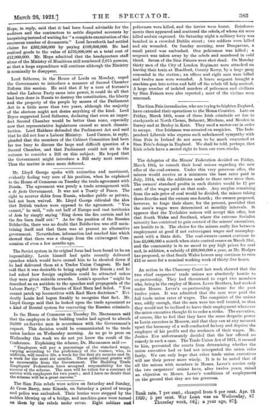An action in the Chancery Court last week showed that
the two chief carpenters' trade unions are absolutely hostile to co-partnership. They had threatened to expel two members who, being in the employ of Messrs. Lever Brothers, had worked under Messrs. Lever's co-partnership scheme for the past twelve years. It was admitted that the men were paid the full trade union rates of wages. The complaint of the unions was, oddly enough, that the men were too well treated, so that they would not be inclined to leave their employment whenever the union executive thought fit to order a strike. The executive, of course, like to feel that they have the same despotic power as Lenin exercises in Moscow, and that they can at any moment upset the harmony of a well-conducted factory and deprive the employer of his profits and the workmen of their wages. Mr. Justice Eve unfortunately decided that the law offered no remedy in such a case. The Trade Union Act of 1871, it seemed to him, prevented the courts from determining whether the union executive had or had not interpreted the union rules fairly. We can only hope that other trade union executives will use their power more wisely. It is to be noted that of all the unions with members in Messrs. Lever's service only the two carpenters' unions have, after twelve years, raised an objection to Messrs. Lever's conditions of employment on the ground that they are too generous.


































 Previous page
Previous page